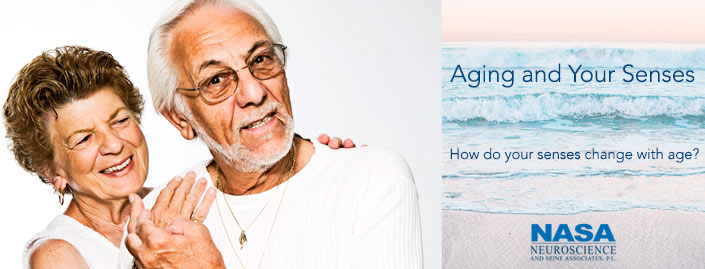How Does Aging Change Your Senses?

As we age our body experiences many changes. Sometimes these changes can directly affect the way that your senses function. While many of us have accepted that we may need hearing aids and glasses, we often don’t consider how our other senses are affected by the aging process.
Smell
Reports indicate that more than 75% of people over the age of 80 experience some type of impairment in their sense of smell. The majority of the loss of smell is most likely based on a decreased ability to replace lost cells. Alzheimer’s disease can also affect your sense of smell.
Taste
At birth our tongue has around 9,000 taste buds, and while the ability to regenerate taste buds can lessen with age, the taste buds are usually not to blame for a loss of the sense of taste. The true culprit in taste loss is usually the sense of smell, because smell plays a large part in detecting taste.
Touch
A loss of touch can have a direct issue with someone’s wellbeing. Peripheral Neuropathy is the most common touch disorder that is associated with the aging process. Peripheral Neuropathy causes what is described as stabbing, tingling, or burning nerve pain. As you can imagine, this can cause major issues with the sense of touch and lead to coordination and muscle weakness.
Vision
All structures within the eye change as you age. Pupils can become slower to react to light changes, lenses may begin to yellow or cloud, and the muscles that control movement lose full rotation. These changes in the functions of your eyes can result in decreased vision, and issues seeing in light, dark, or glare.
Hearing
The inner ear is responsible for hearing and balance, and just like with your eyes, the structure of your inner ear can change over time, which can cause problems with hearing as well as balance.
Neurological Conditions that can Affect the Senses
Along with the natural aging process, certain Neurological Conditions can change the ability for your senses to function properly. These conditions can include:
- Alzheimer’s Disease
- Head Trauma
- Bell’s Palsy
- Chorda Tympani Damage
- Epilepsy
- Korsakoff’s Syndrome
- Multiple Sclerosis
- Parkinson’s Disease
- Tumors and Lesions
Determining the ultimate cause of changes in your senses may involve a series of tests, as well as a consultation with a specialist such as a neurologist.
Sources:
https://www.ncbi.nlm.nih.gov/pmc/articles/PMC2579627/
https://www.npr.org/sections/thesalt/2017/05/05/526750174/why-taste-buds-dull-as-we-age
https://www.mayoclinic.org/diseases-conditions/peripheral-neuropathy/symptoms-causes/syc-20352061
https://medlineplus.gov/ency/article/004013.htm
https://www.ncbi.nlm.nih.gov/pmc/articles/PMC2579627/
